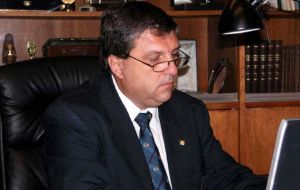MercoPress. South Atlantic News Agency
Argentine gov. planning review of farm export taxes
 Agriculture Secretary Ing Carlos Cheppi
Agriculture Secretary Ing Carlos Cheppi The Argentine government is re-drafting modifications to the grains and oilseeds exports tax system with the purpose of raising the levy on soy but reducing it for wheat and corn, according to reports in the Buenos Aires media.
The administration of President Cristina Fernandez de Kirchner suffered this month a humiliating defeat when the controversial Resolution 125, increasing farm export taxes, was rejected by Congress when government Senators joined the opposition. It was the culmination of a four months stand off with farmers' organizations which also confirmed the collapse of public opinion support for the president and a very delicate political situation for the Kirchners. The Argentine media reports that the new Agriculture Secretary Carlos Cheppi is working on a draft to increase the soy export tax from 35 to 40%, while reducing the tax on wheat and corn five points to 23% and 20% respectively. Sunflower oil seed would remain unchanged at 32%. Argentina is among the world leading exporters of soy, sunflower, wheat and corn, and during the four months conflict when farmers boycotted trading in local markets it affected global markets' prices. The draft would also represent a significant change from the controversial Resolution 125 which was basically a sliding system based on international prices. The new system returns to the fixed rates. The Kirchner administrations all along have argued that the export taxes are geared to re-distribute windfall earnings from booming international prices and to ensure food at affordable prices for Argentine consumers. Argentine farmers organizations accept they must pay some export duties, but considered resolution 125 "outrageous and confiscatory", and are demanding a review of government policies for agriculture, livestock and other farming sectors. However the Kirchner administration seems reluctant to sit and discuss camp policies with farmers fearful it could be interpreted as a sign of political weakness, when not defeat. Besides during the long four month conflict, in which former President Nestor Kirchner played a leading role calling farmers organizations from "coup mongers" to "oligarchs", in the heat of the discussion he admitted the treasury urgently needed the almost 2 billion additional cash (from farm export taxes) to meet budget and international commitments. During most of last year Mr. Kirchner opened the government purse to persuade provincial governors and voters and ensure the victory of wife Cristina Fernandez. The ongoing Kirchners/animosity can be felt at Argentina's largest agro show in the Buenos Aires grounds of Palermo where the mood is of caution and delaying investment plans until the government comes out straight on its intentions. The government's intentions were palpable when they cancelled several traditional stands in the show, a decision emulated by provinces which depend from the Executive Treasury to pay local bureaucracy salaries. It is estimated the Argentine camp invests annually in the range of 8 to 10 billion US dollars but this coming farm year could hold surprises. Raul Gutierrez an important breeder of Aberdeen Angus, the most common beef cattle in Argentina said he was planning to purchase "a couple of bulls" but he had desisted given the "uncertainty" of what might happen. The best indicator of the farmers' spirit will be seen this weekend when the sales of the grand champs begin.




Top Comments
Disclaimer & comment rulesCommenting for this story is now closed.
If you have a Facebook account, become a fan and comment on our Facebook Page!